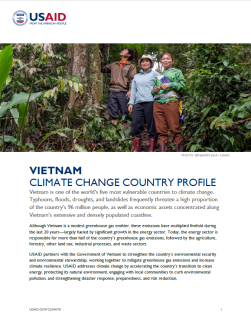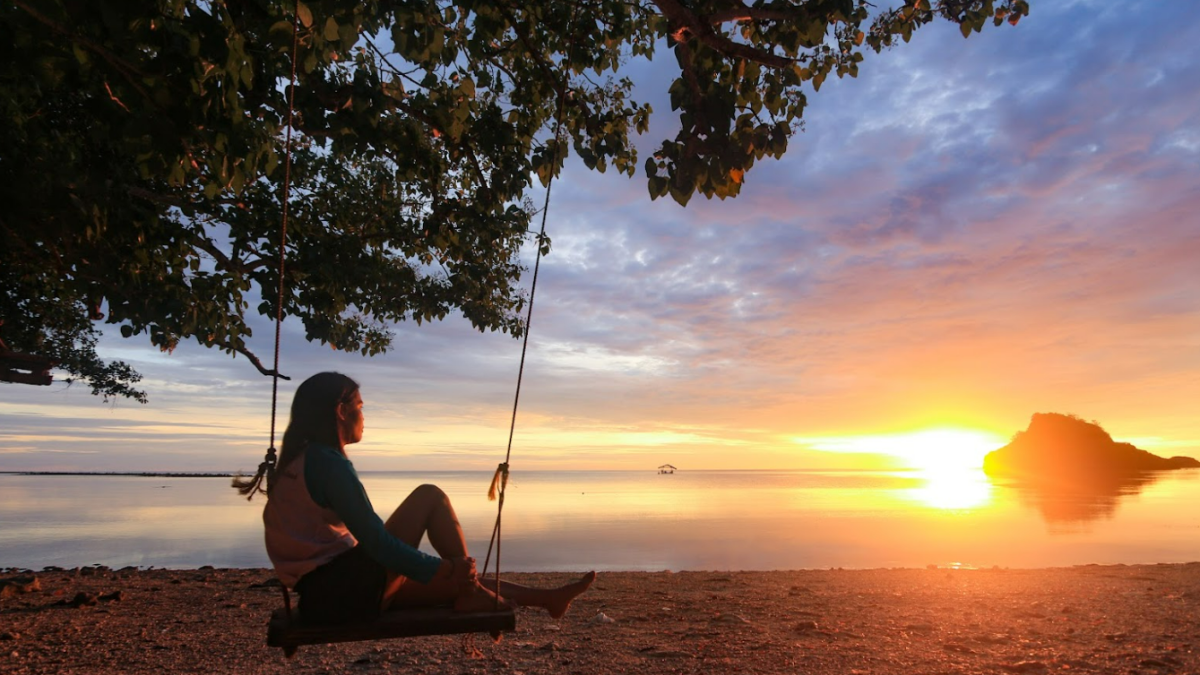Although Vietnam is a modest greenhouse gas emitter, these emissions have multiplied fivefold during the last 20 years—largely fueled by significant growth in the energy sector. Today, the energy sector is responsible for more than half of the country’s greenhouse gas emissions, followed by the agriculture, forestry, other land use, industrial processes, and waste sectors.
USAID partners with the Government of Vietnam to strengthen the country’s environmental security and environmental stewardship, working together to mitigate greenhouse gas emissions and increase climate resilience. USAID addresses climate change by accelerating the country’s transition to clean energy, protecting its natural environment, engaging with local communities to curb environmental pollution, and strengthening disaster response, preparedness, and risk reduction.
Government of Vietnam Climate Priorities
The Government of Vietnam announced at the 2021 United Nations Climate Change Conference (COP26) that it seeks to achieve net-zero carbon emissions by 2050; to align with this target, the Government of Vietnam is reviewing its Nationally Determined Contribution (NDC), a climate action plan to reduce emissions and adapt to climate impacts.
The Government of Vietnam has signed the Global Methane Pledge, the Leader’s Declaration on Forests and Land Use, the Global Coal to Clean Power Transition Statement, and the Call to Action to Raise Ambition for Climate Adaptation and Resilience, and joined the Lowering Emissions by Accelerating Forest Finance (LEAF) Coalition and the Policy Action Agenda for a Transition to Sustainable Food and Agriculture. The Government of Vietnam also released Decree 06/2022/ND-CP in January 2022, creating regulations for the reduction of greenhouse gas emissions and protecting the ozone layer.
USAID’s Climate Change Program: Objectives and Results
USAID supports the Government of Vietnam’s development and climate priorities through programs and partnerships on climate adaptation, renewable energy, and natural climate solutions.
Adaptation
USAID supports the Government of Vietnam to prepare for and respond to natural disasters, restore habitats, and increase the use of nature-based solutions—such as mangrove forests, which serve as a protective buffer to coastal surges—as tools to adapt to climate change. These tools can reduce disaster risk, support livelihoods, and improve food and water security. USAID is investing more than $80 million in climate adaptation programming in Vietnam, including more than $30 million that has already been provided for disaster response and risk reduction and $50 million planned through 2028 to support climate-resilient agriculture in the Mekong Delta.
Key Results
USAID has helped:
- Improve management of 80,000 hectares of natural forests in mountainous areas in central and northwestern Vietnam, which has increased the resilience of more than 13,500 forest-dwelling communities and downstream communities by reducing emissions from land-use change, lowering the risk of climate-induced natural disasters, and increasing access to a reliable water supply during the dry season months
- Support nearly 14,000 people—drawn mainly from poor ethnic minority communities living in mountainous areas of central and northwestern Vietnam—to become better prepared to adapt to the impacts of climate change
- Empower nearly 500,000 people in the Red River Delta and central coast regions of Vietnam with climate resilience tools
Key Adaptation Programs
USAID Sustainable Forest Management Activity
This activity improves the function of forests and ecosystems through restoration and conservation efforts while strengthening timber forest management to support healthy habitats and biodiversity. This work also helps reduce disaster risk, support livelihoods, and improve food and water security.
USAID’s Biodiversity Conservation Activity
This activity supports the Government of Vietnam as it works to maintain healthy forests and protect wildlife populations in the country’s national parks and nature reserves to ensure a stable supply of ecosystem services. This project also increases both the ecosystem functions of healthy forests and the resilience they provide for forest-dwelling and downstream communities.
USAID’s Mekong Delta Coastal Habitat Conservation Activity
This activity strengthens marine resources management to conserve biodiversity and enhance coastal resilience. This work builds climate resilience for vulnerable communities in the Mekong Delta by promoting sustainable fisheries and aquaculture production, and by improving the management of marine protected areas and locally managed marine areas.
USAID’s Climate Resilient Agriculture in the Mekong Delta Activity
This activity supports government agencies, vulnerable communities, and other key stakeholders to access and utilize tools, plans, and services that support climate adaptation and well-being. By restoring and strengthening management of natural ecosystems, diversifying and promoting nature-based livelihoods, and supporting low-methane emission agriculture, the project aims to bolster the climate resilience of vulnerable communities in the Mekong Delta.
Renewable Energy
USAID works closely with the Government of Vietnam to develop and implement energy policies and plans that support scaling up clean energy and mobilizing much-needed investment from the private sector.
Key Results
USAID has helped:
- Support government regulators, banks, investors, and private sector developers to spur solar and wind investments in Vietnam, totaling more than $300 million over five years
- Contribute to Vietnam’s exponential growth in solar energy production, which grew from less than 10 megawatts in 2017 to 16,500 megawatts in 2020
- Support the Government of Vietnam and its Ministry of Industry and Trade to significantly increase clean energy targets as part of the country’s 2021-2030 power development plan; Vietnam aims to increase the share of renewable energy in its total energy mix to more than 30 percent by 2030
- Support the Government of Vietnam and private sector stakeholders in designing, developing, and finalizing the Direct Power Purchase Agreement, approved in 2024; the agreement will help Vietnam attract private sector investment in renewable energy, accelerating the country’s clean energy transition and advancing its goal of net-zero emissions by 2050, and it is expected that it will enable 400-1,000 MW of renewable power transactions between private partners
- Establish a $2.5 million Innovation Challenge Fund to support innovative energy solutions including battery energy storage systems in the commercial and industrial sector, smart compressors, cooling storage systems, smart lighting, and electric vehicle charging stations
- Support Danang and Ho Chi Minh City as the cities organized Vietnam’s first-ever energy efficiency awards, recognizing clean energy leaders and the adoption of sustainable energy-saving practices and approaches
- Support clean energy developers and start-ups to access investment finance, particularly in the dynamic Vietnamese electric motorbike sector
- Establish a Renewable Energy Data Explorer tool to provide a platform to visualize and analyze province-specific geospatial data on wind, solar, and biomass resources alongside locations of transmission lines, protected areas, and other land and infrastructure features
Key Renewable Energy Programs
USAID Vietnam Low Emission Energy Program (V-LEEP II) Activity
This activity supports Vietnam’s energy sector as it transforms into a clean, secure, and market-driven sector by mobilizing investment in the deployment of advanced energy systems, enhancing power system flexibility, and increasing competitiveness.
USAID Vietnam Urban Energy Security Activity
This activity, completed in 2024, worked in Danang and Ho Chi Minh City to improve distributed energy deployment and investment, support the adoption of innovative energy solutions, and mobilize private investments for distributed energy solutions.
USAID INVEST Program
This activity provides technical assistance to de-risk transactions for private sector renewable energy projects and supports greater awareness within the Government of Vietnam of international practices on carbon labeling and climate governance.
Natural Climate Solutions
USAID supports Vietnam in reducing emissions by 1) mobilizing domestic resources to advance sustainable forest management; 2) engaging with private sector companies to improve forest management practices and increase income for forest-dependent communities; and 3) helping Vietnam access the international carbon market.
Key Results
USAID has helped:
- Mobilize more than $1 billion since 2011 through the USAID-supported Payment for Forest Environmental Services (PFES) program, resulting in improved conservation of approximately 40 percent of Vietnam’s forested area—more than 6 million hectares—which benefitted about 500,000 rural households in mountainous areas; through this system, Vietnam sequesters and avoids approximately 20 million metric tons of CO2 equivalent annually
- Avoid or sequester an additional 12 million tons of CO2 equivalent emissions annually as a result of improved forest management practices
- Mobilize $360 million in private investment for natural climate solutions
Key Natural Climate Solutions Programs
USAID Sustainable Forest Management Activity
This activity reduces carbon emissions from forest conversion, increases carbon sequestration through better management of plantation forests, and improves the quality, diversity, and productivity of natural production forests.
USAID’s Biodiversity Conservation Activity
This activity reduces greenhouse gas emissions and increases carbon storage by improving forest conservation and management of 600,000 hectares of natural forest ecosystems in 21 protected areas across Vietnam.
USAID’s Climate Resilient Agriculture in the Mekong Delta Activity
This activity supports reducing methane emissions from rice cultivation and promotes strengthened management and restoration of mangrove forests, melaleuca forests, and natural wetlands to reduce emissions, sequester carbon dioxide, and increase the provision of ecosystem goods and services.




